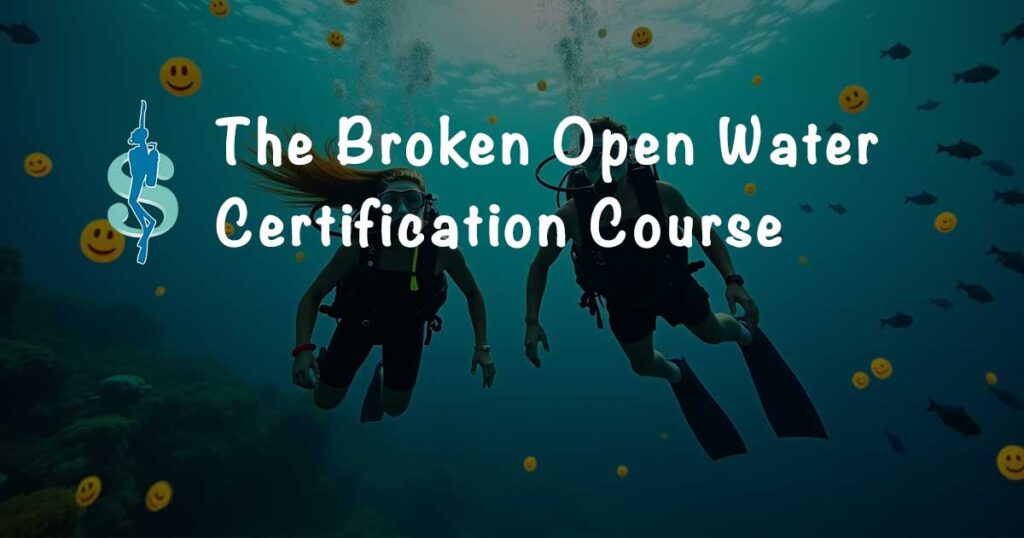How To Fix The Open Water Scuba Diving Certification Course
“A student fresh out of a scuba diving class is just ready to start learning to dive.”
Are entry-level scuba diving certification courses good enough? Are scuba tryouts valuable to consumers? To us?
“Let’s face it – you only enjoy a sport after you get pretty good at it - and a student fresh out of a diving class is just ready to start learning to dive. He has learned theory, and how to use his equipment, but the real knowledge which leads to full enjoyment of the underwater world can come only through practical experience and practice.”
When do you think the above statement was made? A long time ago by Bill Barada – when newsletters were prepared with a typewriter. Don Rockwell, the former CEO of Aqualung, an international dive gear manufacturer & wholesaler, showed me this newsletter in a museum of scuba diving maintained by Aqualung in its upstairs lobby in California.
Up to this day, we’re continuing to have the same discussion on entry-level scuba diving courses.
However, we now have survey results to clearly identify the issues and suggest solutions.
There’s a lot of good stuff in the current dive training programs. But we need to turn around a shrinking dive industry. Therefore, we need to identify pain points and fix them.
This post is part of our Shifting Tides: Dive Industry Assessment & Strategies for Today’s Scuba Divers series by the Business of Diving Institute and Darcy Kieran, author of:
Table of Contents
If It’s Broken, Fix It
For years, we’ve been conducting entry-level scuba diving courses that are relatively short. And for years, the number of certifications has been going down.
Something is not working as intended. It’s time we look at the causes of the problem and find solutions.
Imagine you sell sausages, and you have a person offering people to taste the sausages at a local grocery store every week. And every week, sales go down - for years. Would you continue “as is” or find a way to fix your problems? Right. Perhaps your sausage doesn’t taste good! Or it can be many other reasons. Either way, it’s about time we figure out how to fix it.
Our Obsession With Skills, Courses, and Cards
Scuba diving instructors want to teach as soon as they succeed in their instructor examination (IE). And in many cases, they want to accumulate certifications to reach higher levels in the pyramid quickly (e.g., Master Scuba Diver Trainer, Master Instructor, etc.). Therefore, what are these instructors focused on? They want to teach courses and issue c-cards. They are focused on volume.
Right there, we’re starting on the wrong foot.
We should be focused on providing value and an outstanding customer experience. The volume will follow.
Our focus should be on getting people to go scuba diving, for whatever reason they may have – observing tropical fish or adventuring on shipwrecks in the St. Lawrence River. We are discussing this activity-center approach in A New Paradigm for the Scuba Diving Industry: It’s about diving!
When we go on dive centers’ websites, “courses” are prominently promoted. It’s all about “do this course” at this price, with this and that included.
Then, what do we do with them? We jump into the pool, and we perform a bunch of skills. Then we jump into open water, and we do the same. Remove this. Perform that. Non-stop. In every pool session, we drop a bunch of skills on them. And in open water, we do four dives, and each one has a bunch of skills.
In that context, it’s no surprise that people believe they “got it” after they get their “certification card.” They didn’t have fun scuba diving yet. Doing skills after skills. Writing quizzes and exams. For normal human beings, that is not fun. And that is what they associate with scuba diving after doing all that stuff with us.
Compare that to skiing. When I first went skiing with my kids, we went to the small hill with a ski trainer, doing pizza and spaghetti. I didn’t tell my kids we were going to class! We went “skiing.” My kids were proud they had been skiing, and they wanted to go skiing again. The focus wasn’t on class, courses, skills, or the instructor. The focus was on the activity.
To get the dive industry back on track to growth, we need to talk in terms that are of interest to our potential clients. Nobody sits at home and suddenly says, “I think I should go take a course.” People want to do activities, not take courses.
This was confirmed in a study by Aquis Marketing in which there was a negative impact on receptivity by non-divers to messaging that emphasized skills and training.
Promoting skills, courses, classes, and training turn many non-divers away from scuba diving.
What’s Next?
Providing scuba diving training is an essential part of our industry. It’s often the first step in the customer (diver) journey. Therefore, we’re dedicating a full article to discuss how we can redefine the way we promote and teach scuba diving.
If you have any doubts on the problems we have, consult the results from a survey we conducted recently:
- Survey Results: Evaluating the Quality of Entry-Level Open-Water Certification Courses. How would you rate the quality of your Open Water Diver course? Are open-water divers ready to dive? Evaluating entry-level scuba diving experiences to help the dive industry improve. What is missing in the open-water diver course? Is it better to learn scuba diving at home or on vacation? Is deep diving an essential skill?
Continue reading about Shifting Tides: Scuba Diving Industry Assessment & Strategies for Today’s Scuba Divers.
If you found the information on this page valuable, would you consider buying me a coffee?
Either way, let’s work together on “raising the bar” in the dive industry to satisfy today’s consumers!
Your Dive Industry Compass
Scuba Diving Market Research, Surveys, Reports & Statistics
Shifting Tides
Strategies for Today’s Scuba Divers
Living The Scuba Dream
Plan Your Scuba Instructor Career & Deep Dive the Plan
You may also be interested in The Immersion Zone (our podcast), Scubanomics (our newsletter for dive professionals), and our published books & reference guides.





